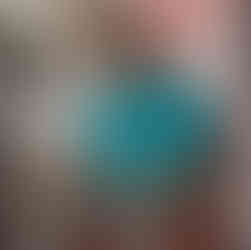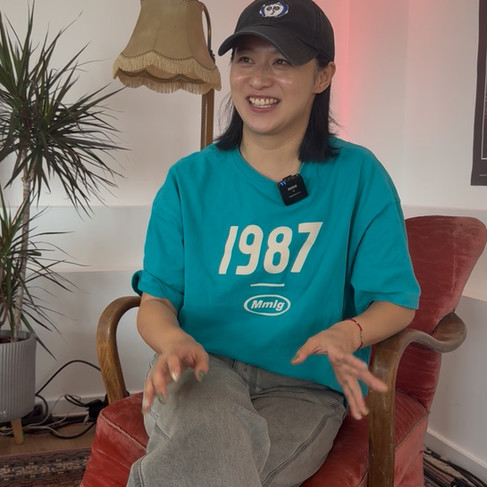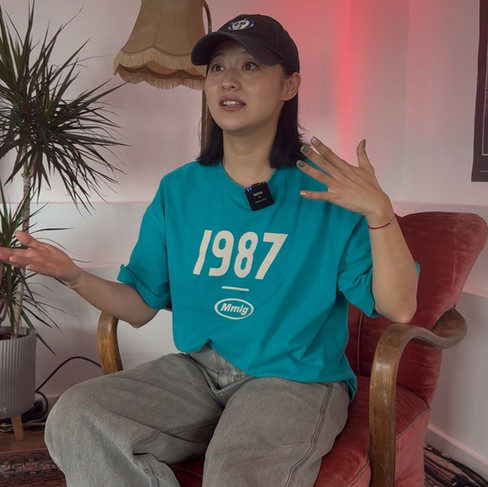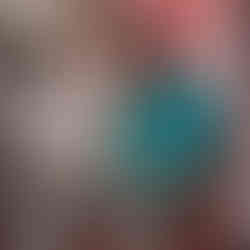SCREEN TIME #2: YUN XIE
- 13. Sept. 2025
- 10 Min. Lesezeit
Aktualisiert: 16. Sept. 2025
Das 32. Internationale Filmfest Oldenburg hat begonnen - und der Kulturschnack ist mitten drin! Für unser Format SCREEN TIME treffen wir jeden Tag eine Person aus dem Festivalbetrieb: Regisseur:innen, Schauspieler:innen oder jemand ganz anderen. Mit ihnen sprechen wir über die Filme, das Kino, die Unabhängigkeit und was uns sonst noch einfällt. Das Ergebnis? Findet ihr als Video auf unserem Insta-Kanal - und als Interview hier!
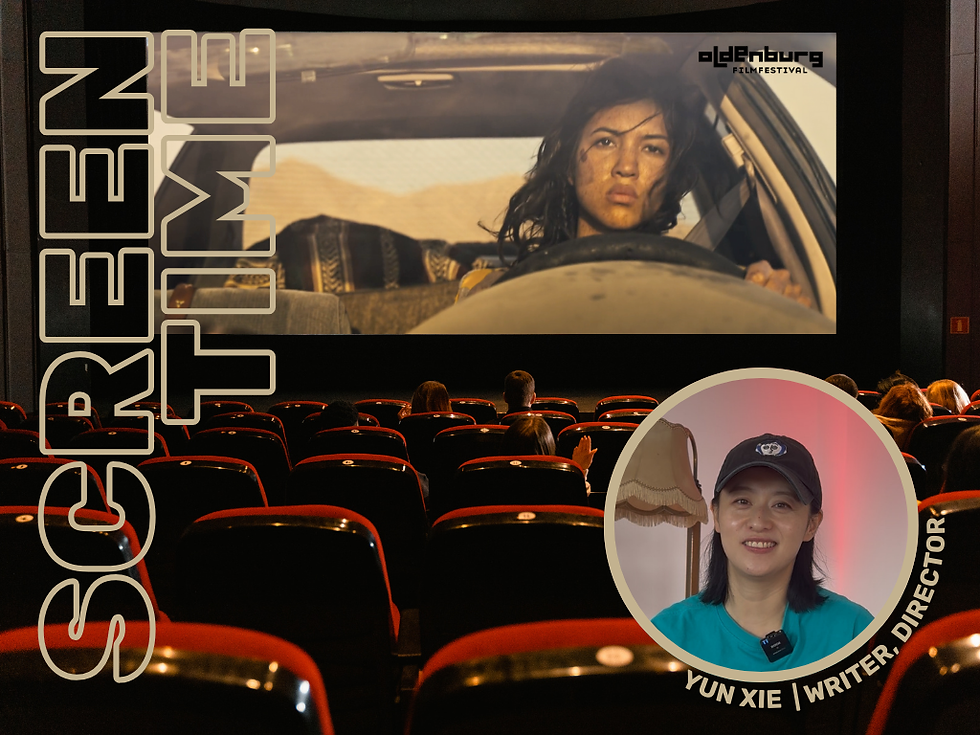
Ganz entspannt kommt sie in den Raum geschlendert: Yun Xie, Regisseurin und Drehbuchautorin aus Los Angeles, Kalifornien. Bevor unser Interview beginnt, hat die gebürtige Chinesin gerade noch Zeit für einen Latte, der - anders als früher - leider nicht mehr von Käthe Kaffee serviert wird, sondern aus dem Automaten kommt. Für einen Koffeinkick reicht's, doch sie lädt uns gleich ein, die Cafés ihrer Heimatstadt zu entdecken: Wann immer wir in L.A. sind, sollen wir uns melden, für einen gemeinsamen Kaffee hat sie immer Zeit. Darauf kommen wir sicher zurück!
Vorher geht es aber erst einmal um Oldenburg und Yuns neuen Film „Under the burning sun“. Auf dem Slamdance Festival wurde er im Frühjahr mit dem Audience Award ausgezeichnet und in der Tat ist die bildgewaltige Parabel ein echter Hingucker: 75 Minuten mit starken Bildkompositionen, intensiven und bedeutsamen Momenten und stimmungsvollen Landschaftsaufnahmen. In SCREEN TIME #2 verrät uns Yun, wieso ihr Film unbedingt in einer Wüste spielen musste, warum die Dreharbeiten an ein Summer Camp erinnerten und warum sie Torsten Neumann Schauspielunterricht geben will.
UNDER THE BURNING SUN
BY YUN XIE
DO 19.00 UHR
CINE K MUVI TICKETS
SA 14.30 UHR
CINE K STUDIO
Yun, your first feature film takes place in a dystopian desert, where a pregnant woman tries to reach a town, where she can get an abortion, which is forbidden where she lives, event though she was raped. There's a lot of anxiety and desperation, but there's also some hope in a otherwise hopeless situation, How did you come up with this story?
It came from a very profound and intimate moment between me and my mom. She was at her very last stage of Alzheimer. I was cleaning her up that day. Actually, I do that every day, but that day the long scar on her lower belly kind of spoke to me. It reminded me of the moment twelve years ago when she had the surgery of hysterectomy, the removal of the uterus. And back then, before the surgery, she asked me a question: Am I still a woman if I don't have my uterus? She wanted to have a conversation with me about what it means to be a woman, but I didn't realize it back then. But when I saw that scar, I realized it was too late, beause she wasn't able to talk anymore. I feel like this whole movie is a conversation I owe my mom.
Mowanza, the main character of your movie, is pregnant after being raped and desperately looking for an abortion. How does that fit into what you just told me?
There is so much pain being a woman. You would be surprised, how many women have experienced a sexual assault. I was talking to my friends and also to the crew surrounding me. Every single woman experienced something similar, either an assault or a harassment or whatever. It happens so often! I guess as long as our body is designed like this it's hard to avoid. But people don't want to mention it. women don't want to talk about it, men don't want to listen to it. So it's almost like a topic we barely touch. But the pain is always there. And because of the pain there's so much anger and you see all that in the movie. I didn't realize I have such an amount of anger in me. Also my friends or other audience were like „You're such a nice and sweet person. I didn't expect there was so much anger in you.“ And I thought: „Yeah, I didn't either“.
You chose a desert as the setting for the movie. Can you tell us why you did that?
The night I thought about the scar of my mum, I suddenly had a picture in my mind: A woman carrying her uterus in a bucket in a desert. I don't know why, it was just there. I started with that image and built the movie up around it. The more I think about it, the more I'm convinced it's symbolic. It's a metaphor. Even though it's beautiful, the desert is bleak, it's barren, there's a lack of water, there's no life over there. It's a kind of a reflection of her situation.
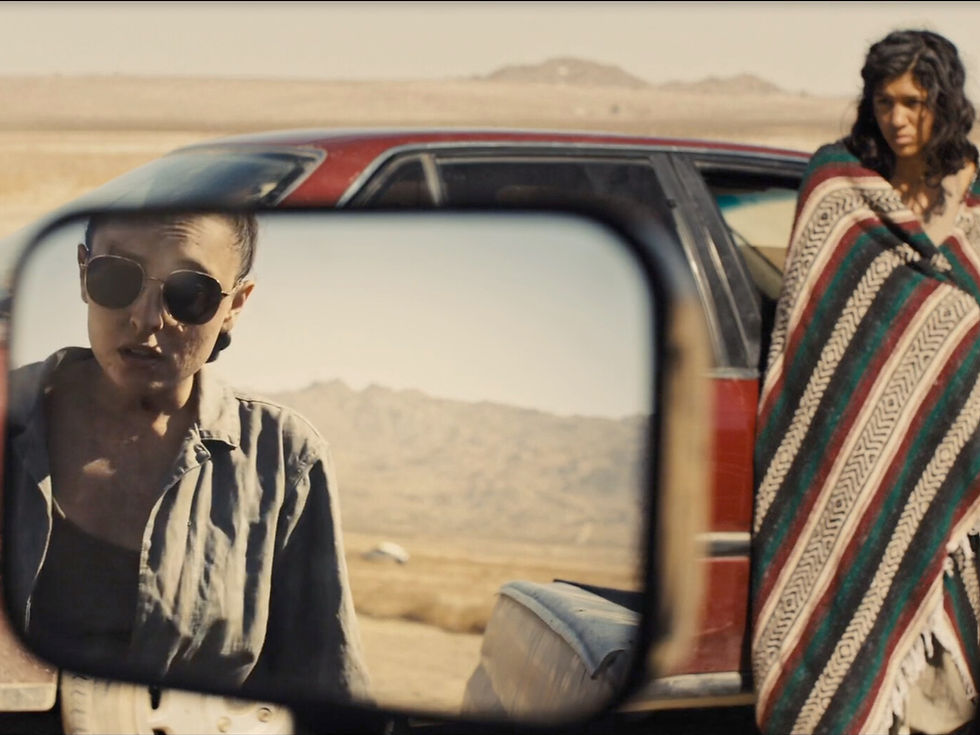
The landscape is really beautiful but as you just said it's also a hostile environment, which makes it even harder for Mowanza. Does the desert maybe have a similar relevance as the other characters?
Yeah, definitely. I think the environment is almost another character. The men in the movie could be kind of an opponent for Mowanza, but they aren't really. It's more like a societal problem. a structural problem that put her into that situation, that made her suffer. You don't really know who's your enemy. So that's why I'm using the environment as an opponent of her. If there's an antagonist, that's the antagonist. So yeah, you're right, the environment is such a huge character in the movie.
The story also deals with the differences between two places. Since you were born and raised in China, but now live in the United States: Is that journey from one place to another maybe a journey you did yourself? Or would it be too far stretched to see the similarity?
Oh, thank your for the question, it's a great question! Actually that is one of the reasons I made this film. I was trying to make it timeless, as if it could happen anywhere. But it's also tied to my background. I am the only child of my mom, because we had this One-child-policy in China when I was younger. Now it changed, but that was how I grew up. So someone made the decision that a you can have only one baby. When we moved to America, we thought it's a country of freedom, liberal, and everything. But like two years ago, the Supreme Court was overturning the right to an abortion. In some states abortion is now forbidden, it's illegal. That means if you are 13 or 14 and you're pregnant, you are not allowed to do abortion. Some girls are too young or too sick to carry the baby. They still have to suffer it. Some even die from it. This two things looks very different and the two countries are so different. But to me they're exactly the same thing and they are kind of echoing each other. A higher power, like the government or religion or whatever, can make a decision over a woman's body, The patriarchy can make a decision over a woman's body while we don't have any voice ourself. So yes, it's very different, but surprisingly, it's the same.
Is there some sort of higher moral or some goal you want to achieve with the film?
As I said, I feel like I owe a conversation to my mom. She was asking me this question: What does it mean to be a woman? I still don't know. Not at all. And I don't have the answer in the movie. But what is important is the end of the movie, the woman holding the bucket walking to the desert.
We don't know where she is going, but she's on the way. I feel like the journey itself is more important than the destination. To keep asking the question is more important than the answer.
Probably there's no answer to it. But if there is a goal, I would say I want to keep making voice with my movie. So people can see it and feel that they can also make their voice. I feel it's important to me.
At the Slamdance Festival you won the Audience Award. Did you expect such good reactions?
No, not at all. That's why I'm so appreciative. I'm proud of it. But I also know that this is not a movie for everyone. I know it's kind of controversial, it's not easy to watch. So I did expect that some people are gonna like this and some people are gonna hate it, but I didn't expect the Audience Award and that so many people resonate with it. That means so much to me! And after the screenings, there were people coming to me to say how much it means to them and most of them were men! One of them told me he was really grateful, because now he can understand his mum better. That's the best result I could have and that's the reason I made this film.
Outgoing: Yun Xie erzählt überaus lebendig von sich und ihren Ideen, vor allem aber von der Leidenschaft Filmemachen. (Bilder: Kulturschnack)
You have written and directed the movie. Is there any part of the production you like better than the others?
Writing is such a love/hate-relationship. I hate it so much, but I also love it on a deeper level. But I really enjoy the pre-production. I think that is maybe one of my favorite parts. In filmmaking you definitely have to improvise on set, but it's all based on how much prep you did. For example, I brought my actors into the desert four or five days ahead of the shooting. They are all big city girls and they are very different from their characters. I wanted them to get into the vibe, and also I wanted them to feel the heaviness of the life in the story. So I had my actors holding rocks and walking that desert to find that right posture, otherwise they would have looked too cute. (laughs) We also had a rehearsal in L.A., where we locked us into the rehearsal room and told us our deepest and darkest secrets. So we build a trust between each other, so we could be really on the same page.
We had to have that trust, because I really put my actors on edge and made them suffer. If they hadn't trusted me, we would have never made it.
So the one part of the process I love most is pre-production. When there is a blank canvas, how do you make people trusting your vision and wanting to paint this with you? I think that's the core of pre-production. For me it's not only about the creative process, but it's also about how you make the team trust each other.

I don't know about your movie, but most indie movies have a tight budget. Can that be an advantage, because it pushes your creativity? Or would you love to have a big budget?
Okay. that's a great question. So for my next movie, I will definitely want a bigger budget. If there's any investor reading this, contact me. But if I want to be one hundred percent honest with you: With a bigger budget for my first feature film, I wouldn't have had the same experience. Because it's so tight on the budget, everyone's wearing several hats. I'm cooking for the crew because we were in the middle of a desert. We don't have restaurants around some of the days, So after a long day, me and my producer, we cooked for the crew and made sandwiches for the next morning. Also, our cars stuck in the sand every single day, so the makeup artist and the actor started to learn how to fix a car and how to pull it out of the sand. That is such a live experience. It almost felt like a road trip or a summer camp, all because of the limited budget. We still talk about it all the time and we have become partners in crime. And there's a secret language between us when we're talking, And when new people hear about our story, they're like „Wow, I want to be part of that“. So, yeah, I would love to have a bigger budget for my next movie, but I feel like the limited budget was right for my first film, so we could have this special experience with each other.
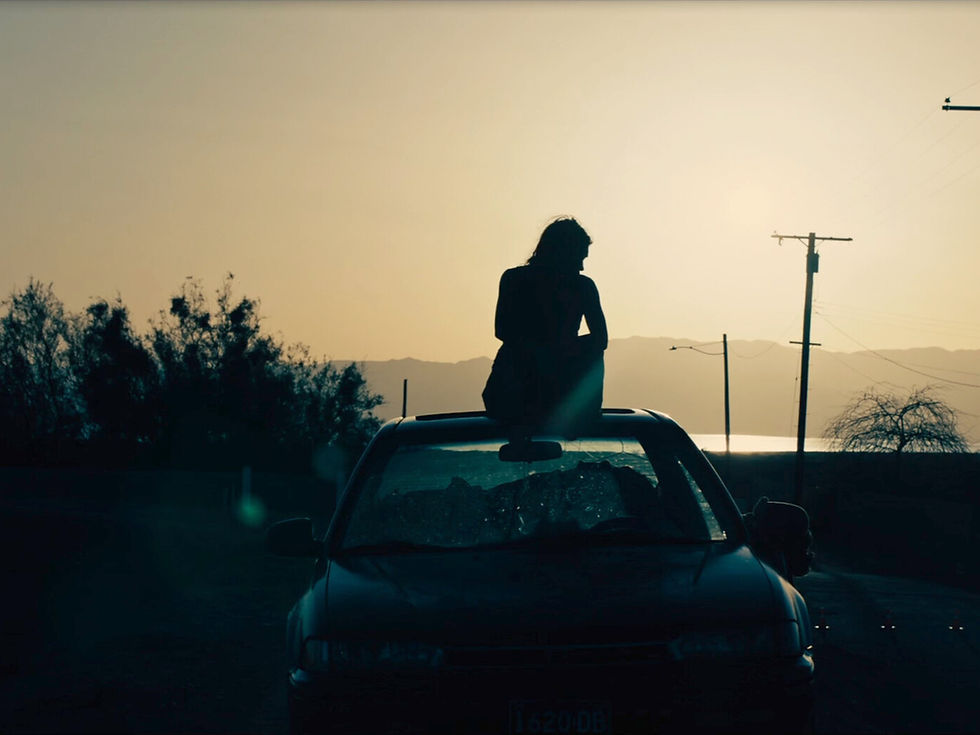
When you're going to shoot a movie, you certainly have hundreds of ideas in your head. What would you say: How many percent of them are good and how many percent are bad?
I'm always say there are three movies: One when you write it, one when you shoot it and one when you edit it. They are completely different, those three movies. Of course I have ideas which seem to be brillant and when I walk onto the set I realize they don't work out at all. Or I think I did a money shot, but in the end I don't put anything of it in the movie. So of course it changes all the time, many things are different or have changed in between. Sometimes I even change the storyline when I do editing. Surprisingly, but also of course, when everything pieces together, that is exactly what I wanted at the very beginning.
When I talked to Brandon Daley the other day, he told me, that he gets very exhausted when he's finishing up a movie. Do you know this feeling?
The editing process for a feature film is super long and you never know when it's ready. So instead of „exhausted“, I would say it's a marriage. One day I woke up and I was like: I fuckin love it! And the other day I hate it, it's so ugly. So, sometimes I hate it, sometimes I love it, sometimes I just don't want to talk to it. I was like, just leave me alone and I see you someday. I will come back to you, but just give me some space. So I walk away for weeks but I'll come back. So I will say the relationship between me and the feature film is like a marriage.
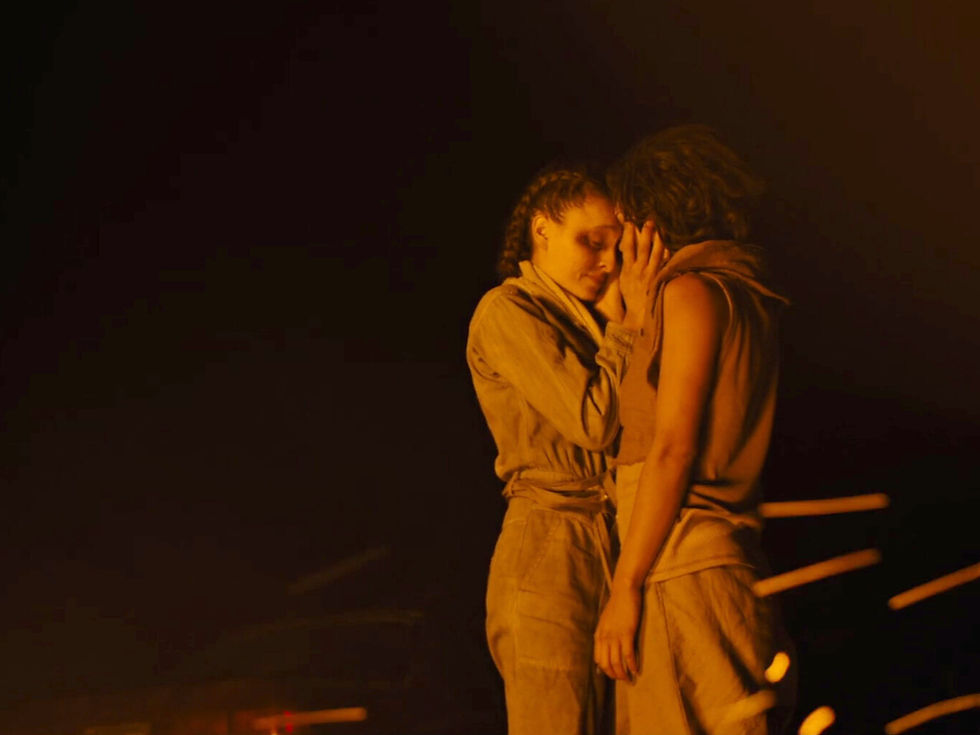
With no divorce ahead, I hope. Another relation that lasts very long is the one between the Oldenburg Film Festival and its director Torsten Neumann. I'm sure one day someone will make a movie about it. But who's gonna play Torsten?
Of course, himself. I would definitely like to make a movie about him, and I would invite him to act himself, and try to persuade him. I do have an acting-coaching background. So don't worry about it, Torsten, you will be good at being yourself.
Now you have to do it!
Yes, I have to do it. I'm pitching for myself (laughs)
It can't get any better than this, so let's stop right here with one last thing. Please complete this sentence: Oldenburg probably is...
...the best place for me this year! I fell in love with this place already,
